
Along a stretch of Charlotte Avenue still populated mostly by used-car lots and auto-parts stores, is a seemingly abandoned storefront. On the door, however, is a very small sign that seems to whisper the name “The Studio.” Behind the door is a recording studio co-owned by The Wood Brothers and their engineer Brook Sutton. Together in that space, they’ve created one of the most impressive releases of early 2020: The Wood Brothers’ Kingdom in My Mind.
The trio of Oliver Wood, Chris Wood and Jano Rix will play the album for their hometown crowd at the Ryman Auditorium on Valentine’s Day. With its timeless mix of blues and hillbilly music, its striking new songs of fable and aphorism, its three-part vocal harmonies, and its nonstop grooving, the album might remind you of The Band in the 1970s. (The Wood Brothers covered The Band’s “Ophelia” on their 2016 album Live at the Barn, recorded at Levon Helm Studios.)
During AmericanaFest in September, the trio held an open house at The Studio to preview the upcoming record. Behind its small, unwelcoming facade, the building is surprisingly large and comfortable. The three musicians set up in the largest room, played two songs from Kingdom in My Mind and then demonstrated how they employed free improvisation to generate ideas for the record.
Arranged in a triangle on the concrete floor, the three players locked eyes as random scraps of music slowly but surely cohered into an actual melody and groove. That’s how all the songs on this new album started.
“We recorded our last album One Drop of Truth with Brook at a studio we really liked,” explains Oliver, the lead singer and guitarist. “At the same time that he lost his lease to that studio, we lost our rehearsal space. So we decided to join forces. Once we moved in, we tested out the studio by setting up in different spaces and just improvising. We weren’t thinking about songs; we were just reacting to each other. This time, because we were in a studio, we could record those jams and actually use them on the album.”
“When you start a project with a blank page,” adds Chris, the bassist, “you can be paralyzed. So you have to contaminate the page with something, and then you can react to that by adding, subtracting or changing things. What you end up with are little pieces of music like those magnets of different words that you can move around on your refrigerator to create poems. The jams created magnets that we never would have come up with in any other situation.”
“We had no preconceptions,” recalls Rix, the percussionist and keyboardist. “We didn’t know if we were playing a chorus or a verse or a turnaround, and that freed us up to try new ideas. You start out doing something very fast in a jam, then the process slows down when you start to edit it.”
The first stop on The Wood Brothers’ 2020 tour was Baltimore’s Rams Head Live, where this writer was in the crowd. They began the show as they begin the new album, with “Alabaster,” a story about a woman who left her angry, cab-driving boyfriend in Alabaster, Ala., for a new life in Manhattan. It began with the bass and drums deliberately lagging behind the vocal phrasing, creating a tension that gradually resolved by closing the gap. When all three players finally clicked together, the liberating sonic release echoed that of the emotional release of the woman in the song. “She’s her own master,” cried Oliver. Chris and Rix answered back, “She won’t be going back to Alabaster.”
On an older song, “Sky High,” Oliver, tall and lean with long, straight red hair, sang: “There’s something ’bout the bass below the melody / The lows tell the highs how to be.” Proving the point was his brother Chris, who drew on decades of playing in top jazz bands to give his upright bass strings a ringing, percussive snap that drove the trio. The younger brother by four years (and shorter by half a foot, with curly hair and a red-and-gray beard), Chris added vocals, harmonica and electric bass throughout the show.
On the trio’s best known song, “Postcards From Hell,” Rix used his left hand to keep time with brushes on the snare drum, while his right hand was filling out the chords on an electric piano, which had been integrated into his drum kit. Oliver’s fingerpicking figure on his archtop guitar, set off by Chris’ bowed bass, proved so infectious that the band didn’t even have to ask the crowd to sing along on the chorus. “I’ve got a soul that I won’t sell,” the packed hall hollered, “and I don’t need postcards from hell.”
Oliver and Chris Wood grew up in Boulder, Colo., and went their separate ways after high school. Oliver wound up in Atlanta as a guitarist for blues artist Tinsley Ellis. When he joined the blues-rock band King Johnson, Oliver began to step out as a writer and singer. Meanwhile, Chris had gone to the New England Conservatory of Music and soon joined keyboardist John Medeski and drummer Billy Martin to form the powerhouse jazz trio Medeski Martin & Wood.
“In 2004 at Ziggy’s in Winston-Salem,” Oliver remembers, “our two bands played together, and I sat in with Medeski Martin & Wood. Having lived separately for so many years in totally different musical circles, we had drifted apart and hadn’t communicated that much. But when we did get back together, we had this psychological, genetic connection that was exciting.”
“Ninety percent of the influences for Medeski Martin & Wood and King Johnson were the same,” Chris says. “They just emerged in different environments. I’d always wondered, ‘What would happen if you brought Charles Mingus and Robert Johnson together in a band?’ That was The Wood Brothers. We felt a lot of affinity with the Tedeschi-Trucks Band. Derek was off in experimental music, and Susan was a bluesy singer-songwriter. We said, ‘Hey, that’s what we’re doing.’ ”
The timing was propitious in two senses. King Johnson had slowed down to just a handful of gigs a year, and so had Medeski Martin & Wood. The brothers suddenly had time on their hands to explore something new. Plus they were now in their 30s, mature enough to avoid the conflicts of 20-something brothers in the same band.
“A lot of brothers who start a band right out of high school have problems,” says Oliver, “because they’re still growing up. We were able to do our growing up away from each other and had already acquired our own identities and self-confidence when we started this band.”
Not only are they able to record and tour together, but they are also able to write songs together, with help from Rix. All three of them are constantly generating bits of lyrics that might go with the music they’re improvising. Chris is the primary editor in assembling the pieces — like those weird magnets on the refrigerator — into a coherent song.
“You never know what you’re looking for,” Chris says, “but you know it when you see it. It’s the same process as when you’re playing — you know when something’s good, because it grabs your ear. You have to play the role of a listener and recognize what excites you. On ‘Alabaster’ there was a great keyboard moment that became the intro, a two-chord vamp with a bass line became the verse, but when the feel changed, it became the chorus. Oliver had some words, and I found a way to make them fit.
“You can generate lyrics so many ways,” Chris continues. “I wrote the lyrics for ‘Jitterbug Love’ over a John Prine song, then I got rid of the country music and set it to music from our jams. The words are just another magnet on the fridge.”







